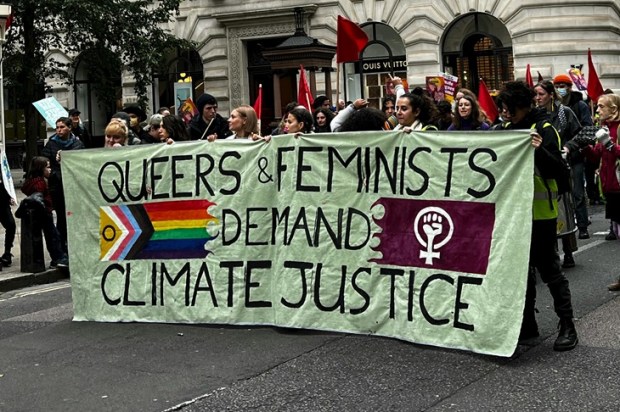Climate change is the gift that keeps on giving. We are familiar with the havoc it is supposedly wreaking on our weather. But this apparently is not even the start of it. According to a new book (The Weight of Nature: How a Changing Climate Changes Our Minds, Brains and Bodies, by Clayton Page Aldern), climate change is also having a profound adverse effect on our inner life.
In hotter and more humid conditions, the author asserts, people’s test scores plummet, anti-social behaviour rises, and the scope for free will narrows. As the author says, ‘Climate change is not only here, it is inside us.’ It gets worse, as our planet heats up, a toxin linked to Alzheimer’s disease and dementia spreads (in blue-green algae), raising the chilling (or perhaps consoling) prospect that, as the Earth boils, a growing proportion of us will be completely unaware of the fact.
If this research is to be believed, continued climate change will produce a global population of ‘zombies’. Not only will we have millions of climate refugees, but millions more of the climate undead: people incapable of either coherent thought or reasoned action, let alone self-control.
The policy implications of these findings are clear. Academic test scores for students in warmer climates should be adjusted upwards, compensating for the climate disability they must labour with. Criminal courts, when considering questions of moral culpability, should be duty-bound to take local temperature readings into account. Indeed, I can see a whole new line of argument for defence lawyers: ‘Your Honour, climate change drove him to do it.’ Advice from the Bureau of Meteorology could be sought when allocating public funding for schools and hospitals.
Indeed, if heat and humidity are such an unmitigated evil (regardless of whether it is caused by climate change), historians might need to reconsider our entire cultural inheritance.
Was the work of the Greek philosophers fatally compromised by the stifling Athenian summers they had to endure? Did the oppressive heat of the Middle East distort and distract the minds of those who established Judaism and Christianity? Could the crimes and misdeeds of European colonialists in Africa be explained by that continent’s particular climate? I look forward to a raft of progressive academic studies to elaborate on these themes.
The lunacy does not end there. Perhaps our basic understanding of psychology and morals needs to be revised. If Sigmund Freud were alive today, he could write about the climate complex rather than the oedipal one – the repressed urge that some have to do harm to Mother Earth. For a modern-day Immanuel Kant, the categorical imperative might have to be narrowed to require the achievement of Net Zero.
Perhaps I am being too dismissive. Indeed, on second thoughts, a strong link does exist between climate change and our mental functioning. This is caused not by the phenomenon itself, of course, but by uncritical belief in climate ideology.
We see evidence of this every day. There is the irrational anger, deep narcissism and indifference to others of climate protesters who glue themselves to roads and destroy treasured artworks. Sadly, there are also the millions of young people who, after years of classroom exposure to climate catastrophism, are paralysed with anxiety and fear whenever there is a flood or fire. But worst of all there are the intellectuals who, almost in proportion to their sense of superiority, have been cognitively compromised laid by this ideological malady.
Whereas the common person has strong natural defences against ideological viruses, intellectuals are highly vulnerable to them. No effective vaccine exists.
As we all know, Karl Marx’s 19th Century work in the British Museum was ground zero for an ideological pandemic that ran riot in the 20th Century. This started out as an economic and political virus, but following the collapse of the Soviet Union, it mutated into a cultural one, shaping progressive thinking on sex, race, and nationality to this day. Our once-esteemed universities, formerly bastions of free speech and debate, now devote themselves to ideological conformity, creating a breeding ground for neo-Marxism in all its forms.
During my Treasury career, I witnessed the creeping influence of climate ideology in our political and bureaucratic life. In the late 1990s, our officials frankly acknowledged the costs and risks of hasty action. Back then, Australian governments argued strongly against ‘one size fits all’ approaches to emissions cuts for high population growth, and resource-dependent economies. As a result, we won a global agreement to raise, not lower, our emissions under the Kyoto Protocol, an early international accord (reflecting our higher costs of abatement).
Only a decade later, however, national interest considerations were cast aside in favour of ideological purity, summed up in the inane slogan ‘Net Zero by 2050’. Scott Morrison and Josh Frydenberg’s capitulation on this front has been rightly criticised, but a captured bureaucracy was never going to alert them to the immense price it would entail.
How, specifically, does belief in climate change ideology disable thought?
If you assert, with absolute confidence, that the (so-called) science underpinning it is settled, you divorce yourself from the world of facts – future empirical evidence can only ever confirm, and never shake, your prior beliefs. You become the antithesis of a scientist. If you believe your mission to save the planet trumps all others, you render yourself incapable of moral reasoning and judgment. If you reject reasonable objections to your favoured policies, you lose the ability to persuade doubters.
In short, the mind of the confirmed ideologue loses its acuity and suppleness over time. By closing itself off from any form of empirical, moral or even intellectual challenge, it becomes stultified. Trapped in a hall of mirrors of its own making. The tragedy is that Page Aldern is right, climate change really is ‘inside us’, only not in the way he imagines.
David Pearl is a former Treasury assistant secretary.

























